C4.38 Is Tap Water Drinkable?
Can tap water (cold water) in the UK be drunk directly?
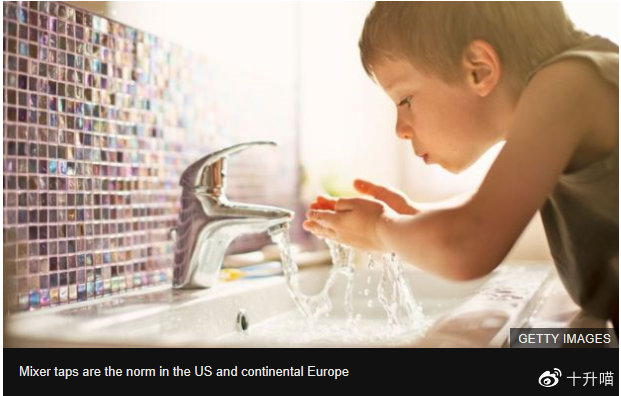
First of all, hot water from taps in the UK is absolutely undrinkable—this includes tap water (cold water) connected to hot water pipes.
Hot water comes from storage tanks that contain a lot of bacteria, making it unhygienic and unsafe. It is also recirculated water that is not regularly cleaned or maintained. The central heating for the entire house in the UK also draws from these storage tanks.
Cold water from separate cold water pipes or kitchen taps in the UK is safe to drink
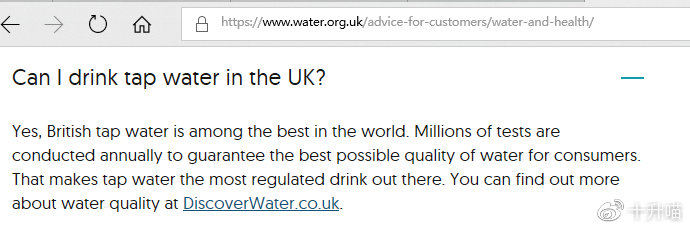
Britons refer to the cold water from taps—i.e., running water—as "tap water" because it comes directly from the mains supply. UK tap water is not only safe but also among the cleanest in the world, even outperforming that of the United States. In 1897, Maidstone in Kent became the first city globally to chlorinate its entire water supply, aiming to prevent waterborne diseases such as typhoid. Around 94% of Britons say they are satisfied with their tap water source, and in blind taste tests, many people cannot tell the difference between tap water and bottled water
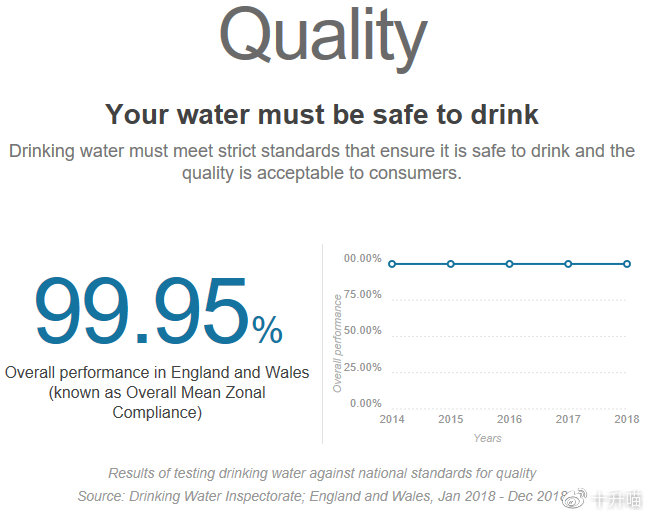
In fact, The Telegraph published an article in 2013 stating that bottled water may not be as safe as UK tap water, as it does not undergo the same rigorous testing. The UK conducts millions of tests every year to ensure its tap water meets the standards proposed by scientific research of the World Health Organization (WHO). In 2014, the compliance rate was 99.96% in England, 99.98% in Scotland, and 99.86% in Northern Ireland. In 2018, it reached 99.95% in England and Wales.
68% of the UK’s tap water comes from surface water, including reservoirs, lakes, and rivers. The remaining 32% is sourced from underground springs and aquifers. Whether you drink surface water or groundwater largely depends on which region of the UK you are in. Generally, tap water in western Ireland and southeast England (including London) comes from groundwater, while that in central and northern England, most of Wales, Scotland, and Cornwall comes from surface water.
Groundwater naturally contains more minerals than surface water, including high concentrations of calcium, magnesium, iron, and manganese ions. This gives UK tap water a "hard" texture, which may take some time for international students new to the UK to get used to. Meanwhile, this hard water quality may lead many international students to mistakenly think that hair loss starts as soon as they arrive in the UK.
In contrast, softer water is usually found further north and is often praised for its pure taste, partly due to the UK’s famously wet climate. Frequent rainfall constantly replenishes the country’s lakes and reservoirs, so the water never stagnates.
The UK has state-of-the-art filtration processes, with slight differences between groundwater and surface water. Since surface water is naturally exposed to more environmental pollutants, several additional steps are required. At water treatment plants, surface water is usually stored in open reservoirs for many days to allow solid contaminants to settle at the bottom. Sunlight also helps break down organic matter and bacteria. Finally, it is filtered through metal grilles to remove floating objects such as leaves.
After that, both types of water go through the same treatment process. A chemical coagulant is added to make sediment particles clump together, making them easier to remove through filtration. Next, the water is aerated to remove unwanted gases (such as carbon dioxide and hydrogen sulfide) before passing through Granular Activated Carbon (GAC) vessels. These vessels contain porous carbon particles that absorb organic compounds in the water, improving its clarity. Finally, ozone is injected into the water to break down pesticides, followed by chlorination to kill any remaining bacteria.
The journey from the treatment plant to your tap can take anywhere from a few hours to a few days. If the distance is long, the water is treated with ammonia, which reacts with chlorine to form a more long-lasting disinfectant.
Although all tap water in the UK is safe, remember these points before drinking:
The Drinking Water Inspectorate (DWI) advises avoiding hot taps, as they are usually connected to hot water storage tanks or heaters rather than directly to the mains supply, and the water may be less fresh.
In rare cases, cold taps may be connected to private water sources or rainwater tanks. Typically, hotels and public places will display a "Non-Drinking Water" sign on these taps, so you know to get water elsewhere.
Occasionally, water may appear cloudy when it flows from the tap. This is caused by excess air, and it will clear up quickly if you let it stand for a minute or two. If you travel to London or other southern cities (such as Oxford or Bath), you may find the taste of hard water unpleasant. Instead of buying expensive bottled water, consider adding mint, cucumber, or lemon to change the flavor. Similarly, chilling tap water can eliminate the slight residual taste of chlorine from the treatment process.
In short, cold water from dual taps connected to hot water pipes is not safe to drink directly. Only the following sources are safe:
Tap water in the kitchen.
Water from separate cold water pipes that are not connected to the hot water storage tank’s pipes.
Tap water not linked to private water sources or rainwater tanks.
For example, in our school’s JA Jaguar Teaching Building, there is a direct-drinking tap next to the toilets. It is a standalone cold water tap, similar to the ones commonly found in airports for direct drinking—unlike the machines in domestic airports that also provide hot water. As shown in the image below, most large shopping malls, airports, and teaching buildings in the UK offer such free drinking tap wate
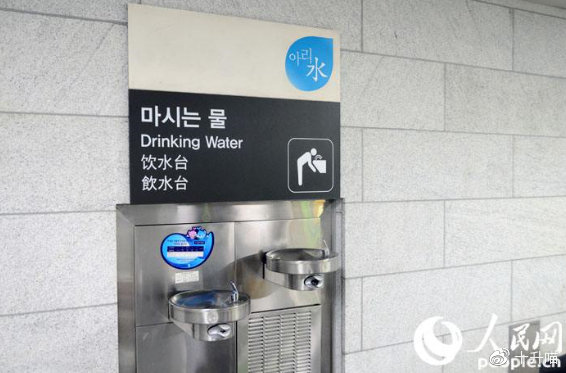
Free Drinking Water in South Korea
Note from Shishengmiao: When asking for water at restaurants, bars, or other service venues in the UK, cold water is provided by default. Almost all of this cold water is directly from the tap, while a small number of restaurants use mineral water or purified water—they will specify in advance if it’s free or paid. If they don’t mention it, you should ask first whether there’s a charge. Of course, if you don’t mind the price, feel free to enjoy it! So, if you want hot water instead of cold, be sure to explicitly say you’d like hot water.
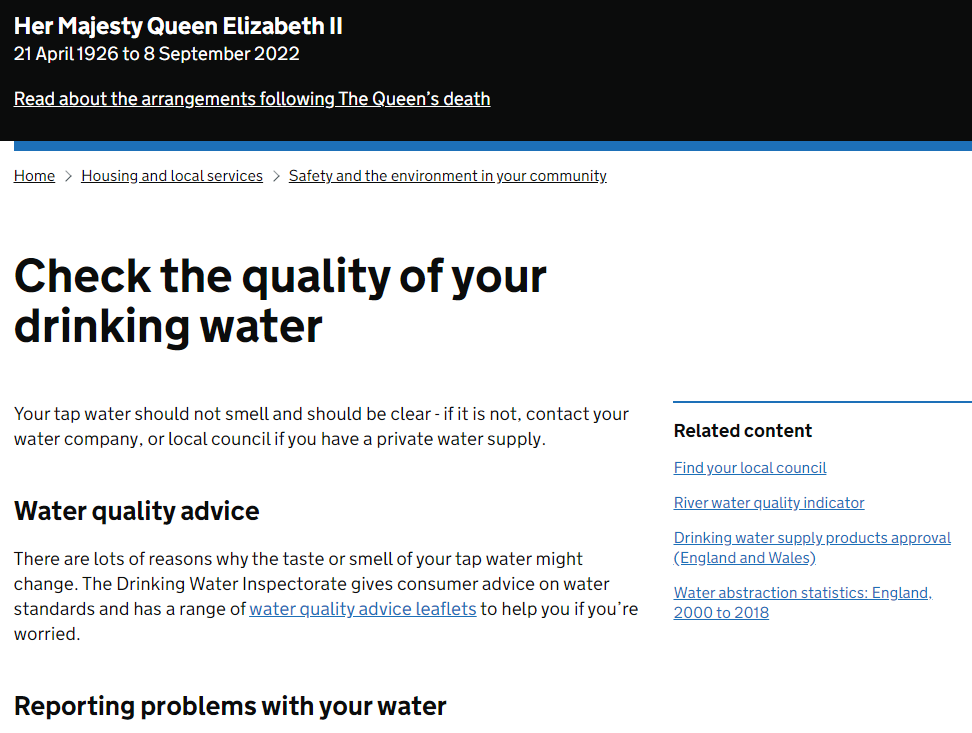
If there are any issues with the water, you will find out through the website mentioned above. UK water companies take over a thousand samples every day to ensure your tap water is safe. If any risks or problems are detected, they will notify customers immediately. In fact, the National Health Service (NHS) advises that infant formula should only be prepared using boiled tap water.
Therefore, there is currently no authoritative expert-proven link between UK water quality and hair loss
Sources:
Tap water: Todosobreelagua.com
London water:
http://Thameswater.co.uk
http://londonist.com/london/features/where-s-my-tap-water-from
Tap water inspection:
http://www.dwi.gov.uk/about/annual-report/2015/index.html
Water source by area:
http://ccwater.custhelp.com/
Londoners embarrassed to order tap water:
https://www.bbcgoodfood.com/content/bottled-vs-tap-water
Bottled vs tap water taste and quality:
http://www.dailymail.co.uk/health/article-3084016/
Recycling in U.K.: http://www.bpf.co.uk/sustainability/plastics_recycling.aspx
Recycling export:
http://energydesk.greenpeace.org/2017/03/13/
Bottled water sales in the U.K.:
http://www.britishbottledwater.org/vital-statistics.asp
TAPP WATER
https://tappwater.co/us/can-i-drink-tap-water-in-london-and-other-parts-of-the-uk/
TRIPSAVVY
https://www.tripsavvy.com/is-london-tap-water-safe-1583358




